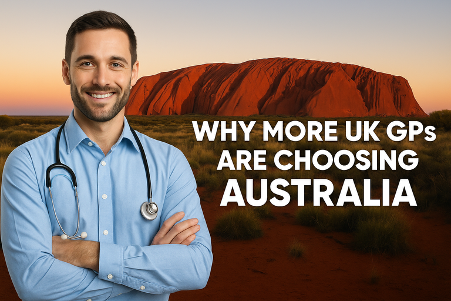Brexit the good news – Australian doctors jobs in the UK

Australian Doctors Jobs in the UK
Brexit means big changes for Britain but not all of them are bad. Opportunities are going to arise for doctors from Commonwealth countries to fill the talent gap left by the exit from the European Union (EU), and none are placed better than highly trained affable Aussie doctors. Brexit is good news for Australian doctors jobs.
When I started in medical recruitment in 2002 for a boutique firm in West London things were very different. Not only were CV’s sent by fax machine, the nationality of the doctors we were recruiting was different too. The majority were from Australia and South Africa and armed with full registration from the General Medical Council (GMC) they were ready to go. Back then doctors from certain commonwealth countries were granted this full registration by the GMC without sitting any exams. These doctors were loved by our client hospitals across the UK. “Send me that friendly Aussie chap again,” they would say to us. Australian doctors are certainly well thought of in the National Health Service (NHS) and regarded as exceptionally well trained, hardworking and easy to get along with. On top of this their general registration status allowed them to work in non-training positions (Staff Grade) which was critical to making sure the health service did not completely fall apart.
What were the changes that impacted on Australian doctors jobs?
In 2005, an EC Directive disbanded the UK’s arrangements to favourable commonwealth countries like Australia and firmly confirmed the UK’s position within the EU. The recognition of professional qualifications laid down in (Directive 2005/36/EC) enabled the free movement of EU professionals such as doctors or architects within the Union. The new laws were designed to promote free movement of labour amongst the member states so EC nationals were given full registration with the GMC. Almost overnight medical recruitment companies were opening offices all over Europe to attract talent for the NHS.
What happened to the popular Australian doctors?
Australians were suddenly categorised as non-EU International Medical Graduates, and to obtain registration with the GMC Australian doctors were asked to pass The Professional and Linguistic Assessments Board (PLAB) exam. Australian doctors would then be asked to prove they could speak English and pass a clinical exam before being granted registration. In addition, changes to immigration laws made it much harder for Australians to obtain a visa to work in the UK. It’s not that it was impossible to make the move to the UK but changes to the laws made it more expensive, uncertain and less flexible. Those who just wanted to “give it a go’’ no longer bothered. Unless they were recognised specialists, the UK was telling Australian doctors not to bother because they were now part of the EU. The Australian doctors jobs had dried up.
Brexit impacts on medical recruitment
Jeremy Hunt has stated that the NHS in England will be “self-sufficient” in doctors after Britain leaves the European Union. He has set out a package of measures aimed at reducing its reliance on foreign-trained medics.
In a recent speech Hunt stressed that foreign-trained doctors do a “fantastic job”, and said that “we want EU nationals who are already here to be able to stay post-Brexit” before adding: “Is it right to import doctors from poorer countries that need them while turning away bright home graduates desperate to study medicine?”
The government plans for the NHS to reach its target in 2025. “Of course it will take several years before those doctors qualify, but by the end of the next parliament we will make the NHS self-sufficient in doctors,” Hunt said.
New opportunities for Australian doctors jobs
Remain campaigners warned in the run-up to the referendum that the NHS, which relies heavily on foreign staff, would be hit if EU workers could no longer travel freely to work in the UK. Data from the General Medical Council records show that 30,472 doctors come from the EU and other countries in the European Economic Area, while 71,139 were trained elsewhere in the world outside the UK. In total, it is estimated that one in four NHS doctors obtained their primary degree outside of the United Kingdom. This spells opportunity for Aussie doctors.
The NHS is facing doctor shortages in many areas of the country across a variety of specialties including A+E and Psychiatry. Although EU staff already in the NHS have been promised they will be allowed to stay, there is no guarantee this will happen when the reality of Brexit hits. Despite promises to open more medical degree places it will be at least ten years before that provides any relief to the NHS. In the meantime, in a post Brexit world we expect that the UK government will look to recruit heavily from Australia, New Zealand, Canada, India and South Africa and reduce the red tape imposed on doctors from several countries. As Australia and New Zealand are currently training far too many junior doctors, fresh opportunities abroad may just come in time to relieve our local capacity issues. Whilst the Brexit brings much uncertainty to the NHS and wider community it could provide an excellent opportunity for Australian’s to widen their career opportunities with new Australian doctors jobs in the UK.
If you are an Australian doctor interested in working in the UK soon, or want to be kept up to date with any changes please register here.
If you are looking for jobs in Australia, register here. If you are interested in high-paying Australian locum jobs and already have general or specialist registration in Australia and a suitable visa (TSS, PR, etc), then please sign up here.









